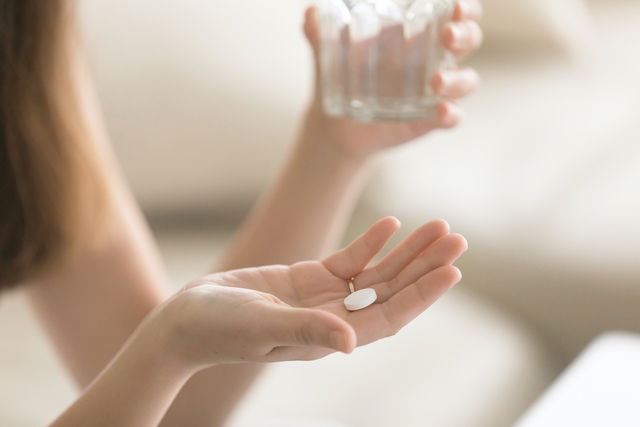Sinusitis medication, like analgesics, anti-inflammatories, antibiotics or decongestants, help to relieve symptoms like a stuffy or runny nose, headache, or facial heaviness. These medications work by helping to decrease inflammation within the nasal sinuses, facilitating secretion elimination or fighting bacteria.
Sinusitis is an inflammation of the nasal sinuses that can be caused by a viral or bacterial infection within the nasal sinuses. This condition can also emerge with allergies.
Medication for sinusitis should be used as directed by a doctor, who will prescribe them based on the presenting symptoms and their severity. There are also some home remedies, like eucalyptus inhalations, that can complement treatment indicated by a doctor and speed-up recovery.

Pharmacy options
There are many medications available for purchase at the pharmacy. These may be available over-the-counter or may require a prescription:
1. Saline solutions
Patients with sinusitis should frequently irrigate their sinuses using saline solutions, like sodium chloride 0.9& or sea salt water solutions. Irrigation can help to clear out the sinuses and reduce symptoms, like stuffy or runny nose. This method can also help to remove irritants and allergens stuck within the sinuses. Read more about how to perform a nasal irrigation using our step-by-step guide.
2. Budesonide
Budesonide, as well as mometasone and fluticasone, are corticosteroids in the form of a nasal spray. They work by reducing swelling and inflammation i the nasal sinuses, and may be prescribed by a doctor to alleviate the symptoms of sinusitis, such as a blocked or runny nose, itchy nose or sneezing.
Check-out other natural ways to relieve a stuffy nose.
3. Prednisone
Prednisone is an oral corticosteroid that helps to relieve the symptoms of severe sinusitis, particularly severe inflammation.
Another corticosteroid that has a similar action that may be recommended by your doctor is prednisolone.
4. Oxymetazoline
Oxymetazoline, as well as naphazoline hydrochloride, are decongestants in the form of a nasal spray. They are indicated to relieve the symptoms of a blocked or runny nose.
However, care must be taken with the use of these products, because excessive use can cause a rebound effect. This is characterized by when the body detects a decrease in nasal secretions, and starts to produce more, worsening the symptom of stuffy nose.
Some decongestants can also be purchased in combination with analgesics, like Tylenol Sinus, to reduce a blocked or runny nose while also relieving pain.
5. Amoxicillin
Amoxicillin is an antibiotic that may be prescribed by your doctor for bases of bacterial sinusitis. This medicine works by eliminating bacteria and preventing the growth of new bacteria.
Generally, sinusitis treatment with antibiotics lasts around 7 to 10 days and should always be directed by a doctor.
Also recommended: Antibiotics for Sinus Infection: 8 Medications tuasaude.com/en/antibiotics-for-sinus-infection6. Acetaminophen
Acetaminophen is an analgesic and antipyretic that can be used to reduce headaches caused by sinusitis, as well as helping to reduce the fever that can occur in the case of bacterial sinusitis. See other symptoms of bacterial sinusitis.
7. Ibuprofen
Ibuprofen is a non-steroidal anti-inflammatory that helps reduce sinus swelling and inflammation, as well as relieving headaches caused by sinusitis.
Also recommended: What Is Ibuprofen? 9 Uses, Side Effects & Contraindications tuasaude.com/en/what-is-ibuprofenThis remedy helps to relieve a sore throat, which is a common symptom associated with sinusitis, due to its proximity to the sinuses. Learn more about the symptoms of a sinus infection that can present.
8. Loratadine
Loratadine is an antihistamine that is indicated in cases of allergic sinusitis. It helps to reduce the production of histamine in the body, which is produced when a person comes into contact with a triggering substances, such as pollen, mold or dust mites.
Other antihistamines drugs that may be recommended by your doctor are cetirizine or desloratadine.
Treatment for children
Medications for children with sinusitis are very similar to those prescribed for adults. These should be monitored by a pediatrician, who will assess symptoms and prescribe based on the child’s presentation, age and weight. Nasal irrigation may be a good option to clean out nasal secretions from the sinuses.
Treatment during pregnancy
Sinusitis medicine, like antibiotics or corticosteroids, are not recommended for pregnant women. They should only be sparingly under the guidance of an obstetrician, as they can cause negative effects to the mom and the baby’s health.
Acetaminophen can be taken safely to relieve pain caused by sinusitis. It is important to take it as directed by a doctor. Natural remedies, like nasal irrigation, some teas and vapor inhalations, are safe during pregnancy.
Home remedies
You can use nebulizer therapy device 2 to 3 times per day for 20 minutes to help clear out the sinuses. They can be particularly effective when used with herbs like eucalyptus or sponge cucumber. An alternative to nebulizing is inhaling vapor during a hot shower.
Other considerations for recovering from sinusitis include ensuring plenty of rest and fluids. Warm compresses on the face and sleeping with your head slightly elevated can help to drain any built-up secretions. Check out other home remedies for sinus infections that you can try to naturally relieve symptoms.
